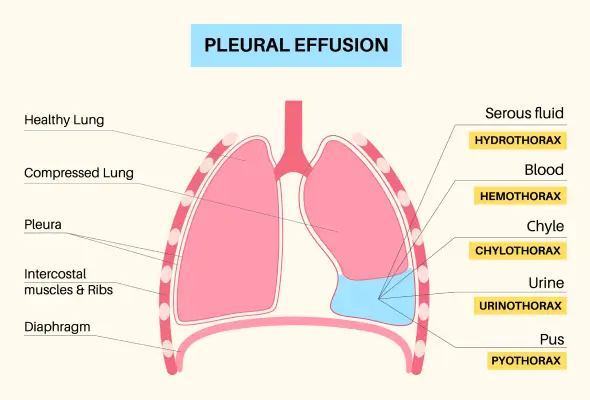Dr. Shilpa Gandhi | Leading Consultant Minimally Invasive Thoracic Surgeon In Nagpur
Meet Our Doctor
Dr. Shilpa Gandhi
MBBS, DNB General Surgery DNB Thoracic Surgery
Dr. Shilpa Gandhi is a trusted and experienced healthcare professional known for her compassionate care and expertise. Committed to delivering personalized treatments and improving patient well-being.


Pleural Effusion Treatment In Korba
What is Pleural Effusion?
The pleural space, a thin gap between two membranes surrounding the lungs, contains a small amount of fluid that helps with smooth lung movement. Pleural effusion occurs when excess fluid builds up in this space, disturbing the natural balance between fluid production and absorption.
Doctors categorize pleural effusion into two types:
- Transudative Effusion: Caused by pressure changes that push fluid through blood vessel walls, often linked to heart failure.
- Exudative Effusion: Results from inflammation that makes blood vessels leak fluid, commonly seen in infections, cancer, or lung diseases.
Normally, the pleural membranes maintain a steady fluid level to support lung function. When this balance is disturbed, excess fluid accumulates, compressing the lungs and making breathing difficult.
For expert diagnosis and treatment of pleural effusion in Korba, consult experienced medical professionals for personalized care.
Pleural Effusion Symptoms
Patients with pleural effusion may experience symptoms based on the amount of fluid in the pleural space. In cases of minimal fluid buildup, symptoms might be absent or barely noticeable.
When symptoms appear, they often include:
- Shortness of breath (dyspnoea), worsening with physical activity
- Chest pain, especially during deep breaths
- Persistent cough, which can be dry or productive
- Fever, commonly seen if the cause is an infection
- Difficulty breathing while lying flat (orthopnea)
- General chest discomfort
Timely medical evaluation is essential for proper diagnosis and treatment.
Causes and Risk Factors of Pleural Effusion
Doctors categorize the causes of pleural effusion based on the type of fluid that gathers in the pleural space. Identifying these causes is crucial for selecting the best treatment plan.
The primary categories include:
Transudative Causes
Heart failure
Liver cirrhosis
Kidney disorders (nephrotic syndrome)
Fluid imbalance conditions
Exudative Causes
Lung infections (pneumonia, tuberculosis)
Cancer (especially lung and breast cancer)
Inflammatory conditions
Post-cardiac surgery complications
Autoimmune diseases
Risk Factors
Several factors can increase the likelihood of developing pleural effusion, such as:
Age: Common in individuals aged 15-34 and those over 55
Medical History: Heart disease, kidney disorders, and autoimmune conditions
Lifestyle Choices: Smoking increases the risk of pleural disorders
Medication Reactions: Drugs like methotrexate and amiodarone may trigger fluid buildup
Chest Injuries: Trauma can cause fluid accumulation in the pleural space
Early diagnosis and proper medical care are vital for managing pleural effusion effectively.
Causes of Pleural Effusion
Understanding the underlying cause of pleural effusion is crucial for effective treatment. The condition is generally classified into two types based on the type of fluid:
Transudative Effusion: Caused by fluid imbalance due to heart failure, liver cirrhosis, or kidney disease.
Exudative Effusion: Resulting from infections (pneumonia, tuberculosis), cancer, inflammatory diseases, or post-surgery complications.
Diagnosis and Evaluation
Our team in Korba uses advanced diagnostic methods to confirm pleural effusion, including:
Physical examination
Chest X-rays
Ultrasound
CT scans
Thoracentesis (fluid sample analysis)
Treatment Options
The treatment plan is customized based on the type and severity of pleural effusion. Options include:
Medication: Antibiotics, diuretics, or anti-inflammatory drugs
Thoracentesis: Needle drainage of excess fluid
Chest Tube Insertion: Continuous fluid drainage in severe cases
Pleurodesis: A procedure to prevent fluid buildup in recurrent cases
Surgery: In complex or chronic conditions
Why Choose Us for Pleural Effusion Treatment in Korba?
Experienced medical professionals
State-of-the-art diagnostic facilities
Personalized care plans
Affordable treatment options
24/7 patient support
Book Your Appointment Today
If you or your loved one is experiencing symptoms of pleural effusion, don’t delay seeking medical attention. Contact us today to schedule a consultation with our expert doctors in Korba. Call Now or Book Online for comprehensive pleural effusion treatment and compassionate care.Book an appointment with Dr. Shilpa Gandhi for specialized thoracic care.



